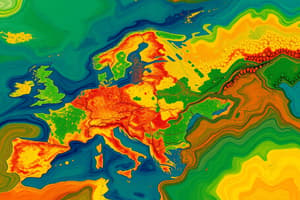Podcast
Questions and Answers
Which of the following is a characteristic of qualitative research methods in geography?
Which of the following is a characteristic of qualitative research methods in geography?
Quantitative methods are more focused on understanding complex social and cultural processes than qualitative methods.
Quantitative methods are more focused on understanding complex social and cultural processes than qualitative methods.
False (B)
What is a crucial aspect to develop when starting geographical research?
What is a crucial aspect to develop when starting geographical research?
A clear research question
In geographical research, ensuring the ___ of participants' data is essential.
In geographical research, ensuring the ___ of participants' data is essential.
Signup and view all the answers
Match the following geographical methodologies with their descriptions:
Match the following geographical methodologies with their descriptions:
Signup and view all the answers
What is one reason why appropriate sampling techniques are vital in geographical research?
What is one reason why appropriate sampling techniques are vital in geographical research?
Signup and view all the answers
Which method is primarily used for gathering quantitative data in fieldwork?
Which method is primarily used for gathering quantitative data in fieldwork?
Signup and view all the answers
Fieldwork methodology does not require careful planning.
Fieldwork methodology does not require careful planning.
Signup and view all the answers
What is a critical aspect of fieldwork in geographical research?
What is a critical aspect of fieldwork in geographical research?
Signup and view all the answers
Qualitative fieldwork methods include interviews and focus group discussions.
Qualitative fieldwork methods include interviews and focus group discussions.
Signup and view all the answers
What is the purpose of thematic coding in data analysis?
What is the purpose of thematic coding in data analysis?
Signup and view all the answers
In fieldwork, ___________ protocols are essential for ensuring researcher safety.
In fieldwork, ___________ protocols are essential for ensuring researcher safety.
Signup and view all the answers
Match the following data collection methods with their appropriate category:
Match the following data collection methods with their appropriate category:
Signup and view all the answers
What is one key advantage of using Geographic Information Systems (GIS) in research?
What is one key advantage of using Geographic Information Systems (GIS) in research?
Signup and view all the answers
Creating layers with different data in GIS does not enhance visual representation.
Creating layers with different data in GIS does not enhance visual representation.
Signup and view all the answers
Name one crucial factor for reliable spatial analysis using GIS.
Name one crucial factor for reliable spatial analysis using GIS.
Signup and view all the answers
Flashcards
Research Question
Research Question
A clear and specific question that guides your research, shaping data collection, analysis, and interpretation.
Qualitative Methods
Qualitative Methods
Methods like interviews, focus groups, and observations that delve into understanding complex social and cultural processes.
Quantitative Methods
Quantitative Methods
Methods using numerical data and statistical analysis to uncover patterns, relationships, and trends.
GIS
GIS
Signup and view all the flashcards
Sampling Techniques
Sampling Techniques
Signup and view all the flashcards
Ethical Considerations
Ethical Considerations
Signup and view all the flashcards
Mixed-Methods Approach
Mixed-Methods Approach
Signup and view all the flashcards
Fieldwork
Fieldwork
Signup and view all the flashcards
Fieldwork Data Collection
Fieldwork Data Collection
Signup and view all the flashcards
Qualitative Fieldwork
Qualitative Fieldwork
Signup and view all the flashcards
Quantitative Fieldwork
Quantitative Fieldwork
Signup and view all the flashcards
Data Analysis in Fieldwork
Data Analysis in Fieldwork
Signup and view all the flashcards
GIS in Honours Projects
GIS in Honours Projects
Signup and view all the flashcards
Spatial Analysis
Spatial Analysis
Signup and view all the flashcards
Data Accuracy in GIS
Data Accuracy in GIS
Signup and view all the flashcards
GIS Visualization
GIS Visualization
Signup and view all the flashcards
Study Notes
Research Methodology in Geography Honours
- Geographic research uses diverse methodologies, from quantitative spatial data analysis to qualitative studies exploring human experiences.
- A clear, explicit, and manageable research question is crucial, guiding data collection, analysis, and interpretation.
- Qualitative methods (interviews, focus groups, ethnographic observation) provide in-depth insights into social and cultural processes, requiring nuanced analysis.
- Quantitative methods use numerical data and statistical analysis to identify patterns and trends. GIS facilitates spatial analysis and mapping.
- Appropriate sampling techniques avoid bias and ensure data representativeness.
- Ethical considerations are paramount: informed consent, data confidentiality, participant well-being are essential.
- A mixed-methods approach (combining qualitative and quantitative) enhances research interpretation and validity/reliability.
Fieldwork in Geography Honours
- Fieldwork is central to geographical research, collecting primary data through surveys, sampling, and environmental observation.
- Selecting the right methodology involves careful planning considering research question, resources, time, and location.
- Meticulous record-keeping (observations, measurements, environmental conditions) is vital using note-taking, photography, and audio/video recordings.
- Quantitative data collection includes measuring distances, using GPS, and making environmental measurements.
- Qualitative fieldwork includes interviews and focus groups to gather in-depth local insights, analyzed through thematic coding.
- Essential safety protocols include hazard identification, PPE, and research team communication.
- Logistics (travel, accommodation, tools) streamlining the process, minimizing issues and ensuring consistent data collection.
- Post-fieldwork analysis involves processing, cleaning, and organizing data using both quantitative and qualitative methods.
- Presentation through maps, diagrams, and reports effectively communicates fieldwork findings.
Geographic Information Systems (GIS) in Honours
- GIS is a powerful tool for inputting, storing, retrieving, analyzing, and displaying geographically referenced data, enabling spatial pattern understanding.
- GIS software allows map creation and spatial analysis, enhancing visual representation and analysis using multiple data layers.
- Spatial analysis in GIS reveals relationships between phenomena (population density, land use, environmental variables).
- Data capturing techniques include importing existing data and creating original field data.
- Data accuracy and quality are crucial for reliable spatial analysis, minimizing errors.
- Understanding coordinate systems and projections is essential for accurate analysis and map production.
- Various GIS software applications exist, including raster analyses for image processing.
- GIS visualizations effectively communicate spatial data, enhancing research communication.
Studying That Suits You
Use AI to generate personalized quizzes and flashcards to suit your learning preferences.
Description
Explore the diverse methodologies used in geographic research, including both qualitative and quantitative approaches. This quiz will help you understand how to formulate clear research questions and the significance of different data collection techniques, including GIS. Test your knowledge on the foundations of geographic research methodologies.




